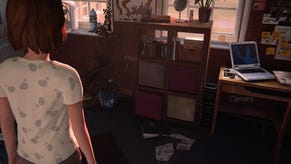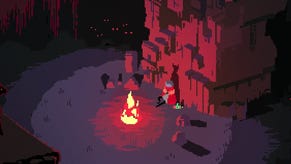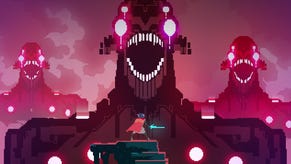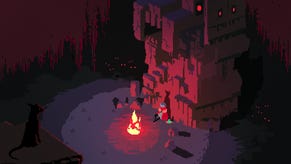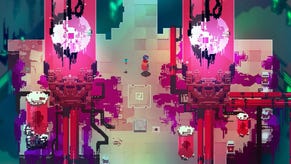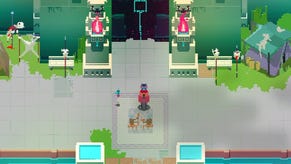Hyper Light Drifter: Exploring October's beta
Ruins-scape
What's the best way to describe Hyper Light Drifter's art style? It's the art, after all, that immediately excites. The world of this action RPG is organic and day-dreamy, but it's also tartly technological. Grottoes and forests and shattered twists of circuitry thread together and entangle. Heart Machine - the name of the developer - is also the phrase that ultimately seems to get at it most precisely: messy life meets cold hardware.
The whole thing's been given a crunchy megalithic weight, too. This is one of those games about exploring a broken and ancient world, rooting around in the debris and discovering its awful secrets.
I begin the current backer demo - popular demand has extended its run for the entire length of October, but it's only available on PC and Mac - in what can only really be described as a glade, and how many of those do you see anymore? A temple's gaping entrance beckons. The stones here are battered cubes, riddled with traces of primeval machinery. The doors have faces like Transformers and there are the dark, gloopy remains of experimental life floating, dead, in the crimson fluid that fills a handful of specimen tubes.
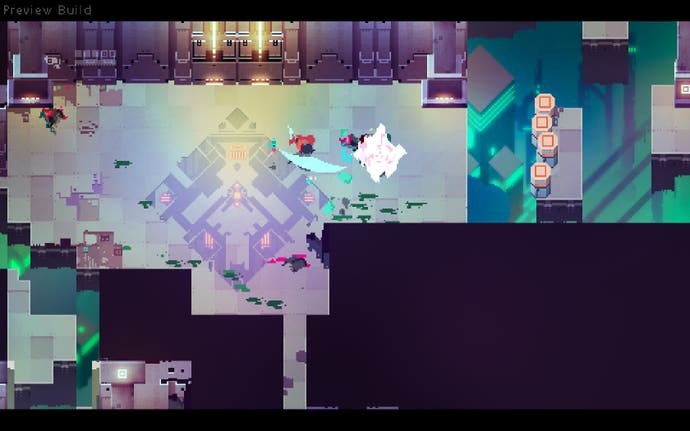
And yet, so pretty! It's a prettiness that extends to the actual business of playing, too. As I test the boundaries of my starting moveset, what excites me isn't the fact I've got a teleport dash, a sword swing, and a sort of space blaster to mess about with, but that they're all delivered with such light-fingered style. That teleport's a violet blur accompanied by the flutter of the protagonist's prog-rock cape, the swordplay is sheer Errol Flynn, a flickbook transition from one heroic pose to the next, and the blaster is soon joined by a charge-up sniper rifle. The latter needs three stages of preamble before it's at full power, and the former takes a wonderfully agonising few seconds to reload.
I knew little of Hyper Light Drifter before I wandered into the demo dungeon, but I was aware that it was good-looking, all Topshop pink and turquoise, and I gathered that the whole thing was a bit like The Legend of Zelda: sweet and delicate and perhaps dreamily keen on puzzles. In truth, I couldn't have been more wrong about that part. I suspect there's a touch of Hyrule in the wider structure - and there's certainly something of Navi to the weird emoticon teapot who flits around you, popping up to open doors - but the game the whole thing really reminds me of - and I can't fully contain my joy at typing this - is P.N.03, the Capcom Five shooter that sold so badly it remained exclusive to the GameCube. I don't think this similarity is intentional, of course. (In fact, I emailed the developer, and I now know it isn't intentional.)
Still! P.N.03! Not widely regarded as one of Shinji Mikami's better works by most people. Most people have not actually played it, mind. Mikami's sterile blaster boldly focuses in on the awkward moments of combat and charges you with making them sing. Like P.N.03, Hyper Light Drifter's been designed on a room-by-room basis - die before the exit here and it's back to the entrance - and the space you traverse is riddled with enemies who are pretty easy to take down one at a time, but whose strengths and weaknesses clip together to form a horrible maze of death when they come at you in combination. There aren't many classical puzzles in the Hyper Light Drifter demo, but in truth, combat against such beautifully engineered foes means that each room is a puzzle, and each fight is a puzzle. A gloriously dynamic one, too.
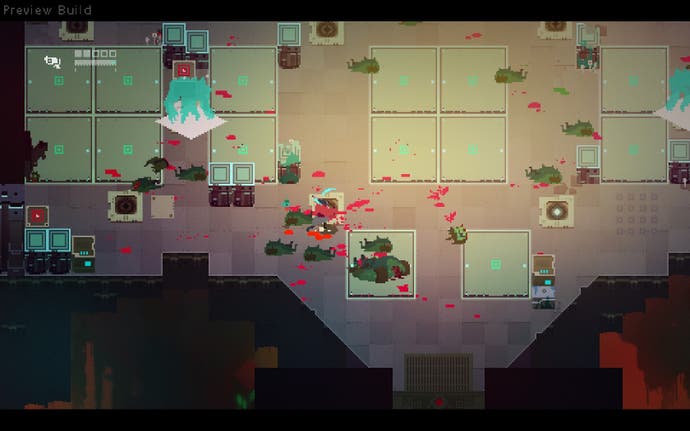
And, as with P.N.03, this is a game about blowing your enemies to pieces before they've got their first attack in. That teleport dash, then, isn't purely for traversal across gaps, but for closing the distance as you prioritise a ranged enemy over a gaggle of melee troublemakers. If you misunderstand the balancing point of each encounter, you're going to be dead in a matter of seconds in many circumstances. That said, even if you judge a room correctly, you still need to pull off your response - zipping past telegraphed attacks, getting behind people, finishing them and then moving on to wherever you're most needed next. P.N.03 always had the feel of a game built around Chess' knight rather than crowd-pleasers like the bishops, rooks, or queens. It was primarily concerned with learning how your own character truly worked. Hyper Light Drifter has a lot of that as well - your funny little death-dealer's nowhere near as wilful and perverse as Vanessa Schneider, but he (or she?) will still make you consider how best to navigate difficult spaces, to pop up where you aren't meant to be, and then to warp off again before you've been spotted.
I love a game that understands cooldowns, and Hyper Light Drifter has them nailed. Your gun takes a little too long to come back online - a perfectly judged little-too-long - so you have to pick your shots, understanding that you may be dealing in knockbacks rather than straight-up kills on occasion. On the other side of the coin, a ranged enemy or a turret drawing a bead on you is terrible, terrible news, but once they're locked onto the spot they found you, they'll empty their entire clip at that position, meaning you can zip around behind them and capitalise on their inability to react.
The final part of the package, for this demo dungeon at least, is the fact that you can fall to your death rather easily in most rooms. It's a decision employed, I suspect, to balance out potential spamming of that teleport dash, but open-edged environments and floors riddled with vanishing platforms also play beautifully into the intricacies of combat design. One huge arena near the very end of the dungeon is a gleeful rolling disaster of a brawl as the floor drops away while perfectly-weighted combinations of foes warp in one after the other. Dash too much and you'll kill yourself in seconds, but the AI's just clever enough to fall, stupidly, for the game's booby traps too, and if you can lure your enemies to the right spots at the right time, gravity will do much of the real work for you.
One dungeon down and I was left wanting more: I want to see how Heart Machine can build on this mean-spirited and wonderfully exacting combat - and I want to see where the light-stepping tour of artful dereliction takes us next.
Hyper Light Drifter is available to pre-order here, and the $25 version will allow access to the preview build for the entirety of October.


